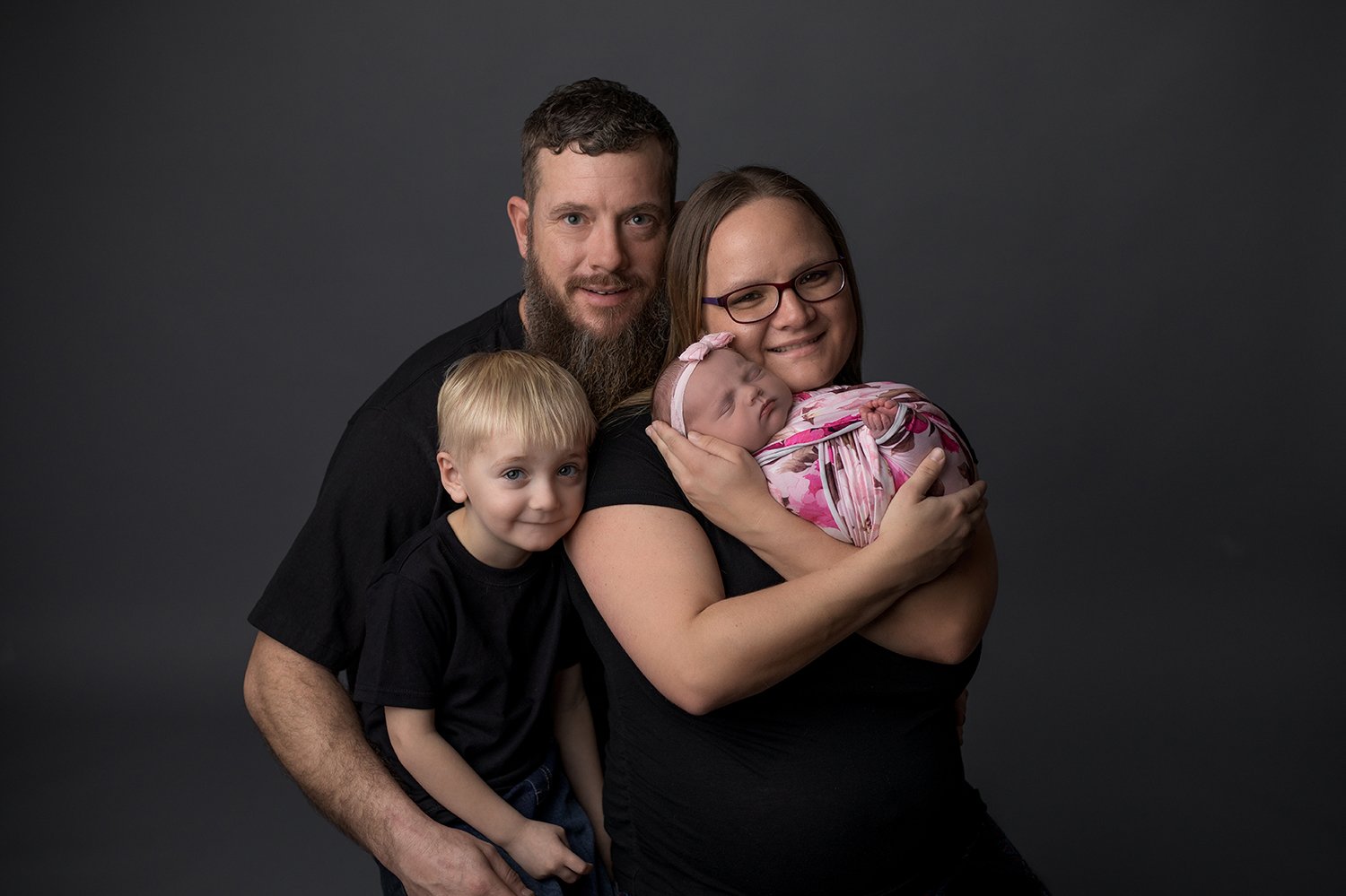In the United States, nearly 1 in 5 women are unable to get pregnant after one year of trying. Infertility is an all too common circumstance that many couples just don’t talk about or feel awkward doing so. Fertility treatments, such as In Vitro Fertilization (IVF), can be an emotional rollercoaster and expensive when insurance doesn’t cover the treatment. Other options, like surrogacy or adoption, can also be costly and just as difficult to handle. However, those who do choose to travel the long, bumpy road to create a family, in any way possible, find it rewarding and worth it in the end.
In this fertility blog series, I offer readers stories from my newborn photography clients who have gone through the ups and downs of infertility on their way to parenthood. Sharing their struggles and triumphs brings to light a common issue that many women face to come together for hope and support.
Meet Shane & Michelle
In 2009, Shane and Michelle began their fertility journey of trying to conceive a child and build their dream family. They had some initial trouble and were still unable to get pregnant after the first few months of trying. The couple “researched” what they could on the internet to help increase their odds – but they were still unsuccessful.
Unfortunately, other underlying factors contributed to their difficulty. When Michelle was 19, she was diagnosed with Polycystic Ovary Syndrome (PCOS) and was told that it might affect her ability to have a baby. PCOS is a hormonal disorder where the ovaries produce high amounts of androgens (male sex hormones) and can cause painful menstrual cycles, small cysts in the ovaries, and often affects a woman’s chance of getting pregnant.
After more months of trying to conceive, Michelle saw her OB-GYN and was prescribed Clomid, an oral medicine that can help treat infertility, and a progesterone supplement. Sadly, this regiment didn’t help, so Michelle's doctor then put her on Letrozole, a medication used for breast cancer treatment but can also be used as a fertility drug in some women. This second medication was also unsuccessful, so Michelle’s doctor recommended a semen analysis for Shane.
Michelle and Shane’s doctors ultimately recommended that the couple try an IVF journey with Intracytoplasmic Sperm Injection (ICSI), where sperm is injected directly into an egg and then transferred to the womb. While this recommendation was a glimmer of hope, the couple was shocked by the price – nearly $20,000 at the time – and insurance wouldn’t cover much, if any, of the cost. Shane and Michelle decided to wait.
A Rocky Start Becomes a Beautiful Blessing
While trying to get pregnant using oral fertility drugs, in 2012, the couple got married. In 2017, after the last few years of trying to conceive, they refocused and turned more towards their careers. Michelle graduated from nursing school and was ready to jump into her passion for medicine and quality patient care. However, shortly after earning her degree, she received an urgent message from a family member saying that they needed to talk.
Michelle’s relative was about four or five months pregnant and, unfortunately, unable to provide for another child. After eight years and much heartache, Shane and Michelle’s prayers were about to be answered. They decided to adopt the relative’s child as their own. On Christmas morning in 2017, the couple became adoptive parents to a beautiful baby boy they named Colton.
Expanding Their Family of Three
After a few years and turning 30, Michelle went to her primary care doctor to ask about trying her luck on the Clomid fertility medicine again. Now with years of medical experience and research under her belt, Michelle was happy to learn that the drug had better success with women in their 30s who had PCOS, and it could help increase her chance of getting pregnant. Her doctor wrote the prescription that day… but Michelle understandably had cold feet.
What if Clomid didn't work again? Were they prepared for negative pregnancy tests, the emotional ups and downs, or, worse, a miscarriage? Shane and Michelle decided they were strong enough to handle the challenge and traveled down the road of fertility treatments again.
“Let’s Do This”
More months went by, and Michelle was on her last month Clomid, at the highest dose possible, and planning to try another medication if this try didn’t result in pregnancy. Life was busy, and she felt a little “off,” but Michelle had always felt that way with her PCOS diagnosis and its harsh symptoms. But, in 2020, the day after Easter, she decided to take a pregnancy test just to be sure.
To Michelle’s shock, the pregnancy test read positive almost immediately! She showed the test to her husband and simply pointed at it dumbstruck. Shane responded, “Are you serious?” The two stood there staring at the positive result for a while, astonished but happy.
Baby Abigail was born in 2021 – to dad (Shane), mom (Michelle), and a loving big brother (Colton).
Newborn & Family Photographer in Midland, MI
Infertility is a difficult journey that many families keep to themselves. However, the more these stories are shared, the more we can empower others to come forward and be open about their struggles. Infertility is not something to be ashamed of, and together we can reduce the stigma and have discussions of support.
If you would like your story highlighted in an infertility blog – and celebrate your new and growing family – I’d love to hear from you. I am a maternity and newborn photographer in Mt. Pleasant, MI, looking to capture your heartfelt story and gift you lasting memories through meaningful print and digital imagery.
Privacy is also an essential aspect of my business, so you don’t have to worry if that’s something you’re not interested in. If you’re looking for newborn or family photography services without the pressure of sharing your journey, I understand. Your family and your personal story will remain confidential. All images and fertility journeys are shared only with my client's permission.
External Resources:
https://www.hopkinsmedicine.org/health/conditions-and-diseases/polycystic-ovary-syndrome-pcos







